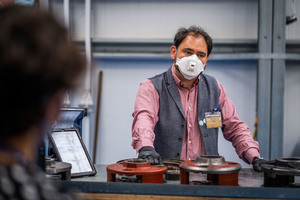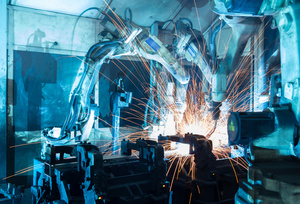

|
Edward Lowton
Editor |


|
| Home> | Plant, Process & Control | >Industry 4.0 | >Digital spare parts: innovation to solve supply chain woes |
Digital spare parts: innovation to solve supply chain woes
19 September 2024
AS THE manufacturing industry has evolved, accessing critical spare parts has become more and more challenging. In recent years, supply chain disruption, conflict and economic upheaval have made finding solutions to the problem critical.

Accelerating ambitious ideas into real-world solutions requires partnership. Innovate UK, the UK’s innovation agency, leads the £300m Made Smarter Innovation Challenge which set out to achieve four ambitious goals:
- Boost efficiency and competitiveness by creating a more productive and sustainable manufacturing sector, allowing the UK to compete on a global stage.
- Create high-skilled jobs in advanced manufacturing
- Strengthen and streamline UK supply chains, strongly impacted by the pandemic, fostering resilience against disruptions and optimising efficiency for a smoother flow of goods.
- Minimise environmental impact by optimising processes and reducing waste.
Funded by a joint effort from Government and industry, the programme fostered a unique ecosystem which created connections and collaborations between academia, technology sectors, and manufacturers, and ensured people are at the heart of digitalisation.
It introduced various funding mechanisms to achieve its goals: Industry-Facing Academic Research Centres; Start-Up and Scale-Up Accelerators; Collaborative R&D (CR&D) projects; and Innovation Hubs.
Supporting over 500 companies
Over the last five years the Made Smarter Innovation Challenge has engaged with over 500 companies, with more than 300 organisations receiving funding of over £120m directly, or indirectly through the hubs, showcasing the programme's reach. With this has come industrial co-investment of £147m, demonstrating strong buy-in from business, and hurtling towards exceeding our £162m target.
The challenge is now in the final year of a five-year programme and we are seeing impacts emerging in the areas of productivity, sustainability and resilience.
One of the major outcomes is the emergence of a vibrant community of digital technology providers, developers, and manufacturers. These partnerships are supported to fast-track ideas and digital innovation using advanced technologies such as artificial intelligence, machine learning and data analytics, additive manufacturing, robotics and automation, virtual reality and augmented reality, Industrial Internet of Things (IIoT) and Blockchain.
Case study one: Renewable Parts and Angus 3D Solutions
One great example of an innovation which builds a more productive, sustainable and supply chain resilient manufacturing sector is a Made Smarter-backed collaboration between Renewable Parts, a parts refurbishment specialist, and Angus 3D Solutions (A3D), a 3D printing expert. Their partnership is finding innovative solutions to remanufacture hydro mechanical, electrical and electronic components, which would otherwise go to landfill, and accelerating the circular economy in the wind power industry.
Renewable Parts, based in Lochgilphead, Scotland, is a supply chain and refurbishment specialist in the wind energy industry. It gives customers quicker and more affordable access to used components in exchange for refurbishing parts for feed stock.
When a turbine is offline it is losing revenue. So maintenance and repair is critical. With the costs of raw materials on the rise and a focus on more sustainable manufacturing methods, there has been a shift by the wind power sector towards the circular economy to cut waste and carbon, and reduce downtime.
In the last 10 years, Renewable Parts has refurbished parts for over 2,000 wind turbines, diverting over 100 tonnes of scrap from waste and landfill.
The challenge is that replacement components fluctuate in availability and price. This drove the business to explore new ways to engineer the parts and remanufacture those that may have previously been scrapped, improving the supply chain.
Replacement Parts explored using 3D printing to overcome problems with parts which were beyond repair and couldn’t be replaced very easily. It began collaborating with A3D, an expert in using 3D scanning technology to reverse engineer parts and 3D printing with plastics and metal to manufacture broken or difficult to source parts, or patterns for casting.
In one use case A3D was able to produce gearbox components where supply fluctuated, impacting turbine availability. These advances allowed Renewable Parts to improve lead-time, continuity of supply and cost, protecting turbine operations and reducing environmental impact. The parts’ print pattern is now stored in a Renewable Part’s digital warehouse to be manufactured whenever the opportunity arises.
The collaboration has also helped Renewable Parts develop in-house expertise and capacity, freeing A3D to push the boundaries of engineering and technology to find solutions.
By sharing expertise, Renewable Parts and Angus 3D have fast-tracked innovation and developed a synergy which has boosted the opportunities for the circular economy.
Joining communities together to drive positive change and transform UK manufacturing is exactly what we wanted to achieve.
Case study two - The Digital Spare Parts Supply Chain (DSPSC)
Finding replacement parts is one part of the challenge the industry faces. But what about the step before: knowing when a part needed to be replaced.
One Made Smarter Innovation-backed project, Digital Spare Parts Supply Chain (DSPSC), set out to demonstrate how smart technologies could be used to transform factory maintenance in the future. It brought together supply chain management company NBT Group Ltd, along with industrial software business Senseye Ltd and academic experts from the University of Northumbria to explore how artificial intelligence could be applied to inventory control and supply chain management in the manufacturing industries.
The collaborators investigated the feasibility of connecting two smart technologies to achieve this goal: Senseye Ltd’s predictive maintenance software, which provides industrial maintenance teams with an indication of which parts will need replacing and when; and NBT Group’s stock management software.
The project modelled the benefits such a system would bring across various sized factories, and proposed that the value of those savings on a large manufacturing site could be in the region of £40m.
These potential savings come from multiple efficiencies. Removing administrative and manual tasks, and connecting these systems digitally, means unnecessary stock holdings could be reduced, freeing up space for production, driving down costs and carbon emissions. It could also create efficiencies among a wider manufacturing supply chain, providing for improved client work scheduling.
It also impacts the workforce. A connected factory doesn’t need someone to check on machinery, allowing businesses to utilise people in higher value roles.
Connecting predictive maintenance and digital supply chain technology could also offer benefits to other sectors.
While the project looked at factory machinery, there is scope for any organisation that has machines and parts that require repair or industries that have a digital inventory, such as a finance system,
The opportunities are huge, and the outcomes and knowledge acquired from this project will pave the way for further research and development, with the ultimate aim of exploiting new technology to help increase productivity, create more highly skilled roles and become more economically, socially and environmentally sustainable.
What’s next for Made Smarter Innovation
These are just two examples of the power of innovation through collaboration, the driver behind the broader Made Smarter Innovation challenge. We are aiming to harness the power of this ecosystem to deliver a modern, connected, resilient and flexible, significantly more productive, and environmentally sustainable UK manufacturing sector and a vibrant technology sector that enables that transformation.
Our ambitions are to increase UK GVA by £2.3bn, create thousands of highly skilled jobs, raise productivity by 30%, create a 4.5% decrease in carbon emissions, create a 25% decrease in manufacturing waste, and allow the UK to shape the future of manufacturing.
With one year of the challenge to go, Innovate UK backed by UKRI will continue to engage further, accelerating and expanding innovation through collaboration for the people-led digital manufacturing future we need.
Made Smarter Innovation
Web: madesmarter.uk
- Made Smarter creates 60 digital manufacturing leaders
- Helping SME manufacturers make the most of cobots
- Yorkshire manufacturers urged to "act now" to claim vital grant funding for technology
- Innovative leadership helping SME manufacturers take on toughest test
- Collaboration key to powering forward digital manufacturing
- BEP Surface Technologies slashes energy use by 20% with data-driven project
- Digital transformation confusion risks paralysing SME manufacturers
- Cardboard cutout manufacturer invests in AI and automation
- Helping tackle fractured supply chains
- Made Smarter-backed engineering firm hails 'phenomenal' impact after smart factory success
- Introducing Industry 4.0 to SMEs
- Enhance maintenance practices
- Digital transformation: Customer insight matters
- IoT digital experiments as a service
- Smarter maintenance: Paper available
- Condition monitoring & Industry 4.0
- Smart data collection
- Mechanised welding, cutting and Industry 4.0
- Tomorrow’s tech is here today
- The business value of Industry 4.0



















